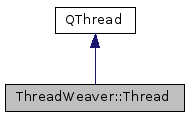ThreadWeaver
#include <Thread.h>

Signals | |
| void | jobDone (ThreadWeaver::Job *) |
| void | jobStarted (ThreadWeaver::Thread *, ThreadWeaver::Job *) |
| void | started (ThreadWeaver::Thread *) |
Public Member Functions | |
| Thread (WeaverImpl *parent=0) | |
| ~Thread () | |
| unsigned int | id () |
| void | msleep (unsigned long msec) |
| void | requestAbort () |
| void | run () |
Detailed Description
The class Thread is used to represent the worker threads in the weaver's inventory.
It is not meant to be overloaded.
Constructor & Destructor Documentation
|
explicit |
Create a thread.
These thread objects are only used inside the Weaver parent object.
@param parent the parent WeaverImpl
Definition at line 68 of file Thread.cpp.
| Thread::~Thread | ( | ) |
The destructor.
Definition at line 75 of file Thread.cpp.
Member Function Documentation
| unsigned int Thread::id | ( | ) |
Returns the thread id.
This id marks the respective Thread object, and must therefore not be confused with, e.g., the pthread thread ID.
Generally, the way threads are implemented is not specified. id() is the only way to uniquely identify a thread within ThreadWeaver.
Definition at line 80 of file Thread.cpp.
|
signal |
The thread finished to execute a job.
|
signal |
The thread started to process a job.
| void Thread::msleep | ( | unsigned long | msec | ) |
Provide the msleep() method (protected in QThread) to be available for executed jobs.
- Parameters
-
msec amount of milliseconds
Definition at line 115 of file Thread.cpp.
| void Thread::requestAbort | ( | ) |
Request the abortion of the current job.
If there is no current job, this method will do nothing, but can safely be called. It forwards the request to the current Job.
Definition at line 120 of file Thread.cpp.
| void Thread::run | ( | ) |
|
signal |
The thread has been started.
The documentation for this class was generated from the following files:
Documentation copyright © 1996-2014 The KDE developers.
Generated on Tue Oct 14 2014 22:48:53 by doxygen 1.8.7 written by Dimitri van Heesch, © 1997-2006
KDE's Doxygen guidelines are available online.
 KDE API Reference
KDE API Reference